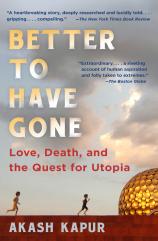Better to Have Gone: Love, Death, and the Quest for Utopia
Review
Better to Have Gone: Love, Death, and the Quest for Utopia
An eerie mystery wrapped in Eastern mysticism is at the heart of this intriguing examination by journalist Akash Kapur as he explores, with his wife Auralice, the deaths of her parents in a little hut in India in 1986.
John Walker, heir to prestige and power, rejects the lifestyle of his father, the director of Washington’s National Gallery of Art. Belgium-born Diane Maes becomes a rebel after the death of her father, lands in reform school, befriends a hippie and winds up in India, where she will meet John, who is on a quest of his own. Both become ardent members of the experimental community Auroville, which was founded on principles espoused by Swami Sri Aurobindo and carried forward by his chief follower, a Frenchwoman known as the Mother.
"It’s a tangled web, and pulling apart each skein combines Kapur’s deft penmanship and sharp observational powers with a devotion to his spouse... BETTER TO HAVE GONE is both emotionally nourishing and intellectually provoking."
Bernard, a young Frenchman involved in the resistance against the Nazis, survives brutal torture and confinement to find his sense of true release when he meets the Mother, who renames him: he becomes Satprem, “the one who loves truly,” and plays a crucial role in the gradual development of Auroville…and, possibly, in the shadowy deaths of Auralice’s parents when she was a young teenager.
Auralice and her husband return to the ashram-like community in 2004 to resolve that mystery and the long-suppressed feelings associated with it. Kapur, who also grew up in Auroville, finds an old folder of John’s letters and papers that provide some clues. But questions remain. Could John’s illness have been prevented or cured if he had been less stubbornly dedicated to certain spiritual principles? Did words from Satprem influence Diane’s fateful decision to join her departed spouse and leave Auralice an orphan?
Investigating the sequence of those extraordinary few hours in 1986 in Auroville has not proven easy, but the author and his wife have recommitted themselves to this idealistic communal setting and are raising their two children there. Kapur builds his story in a rich, person-centered chronology that includes the ideals and motivations of the 1960s hippie movement and its connection to principles and practices of Eastern religion and philosophy. It’s a tangled web, and pulling apart each skein combines Kapur’s deft penmanship and sharp observational powers with a devotion to his spouse, who has aided him at each step, and an intrinsic sense of confidence in the concepts that made Auroville a reality and continue to guide its destiny.
BETTER TO HAVE GONE is both emotionally nourishing and intellectually provoking. Kapur suggests that the questions left unanswered are part of a greater, universal mystery that we all live within.
Reviewed by Barbara Bamberger Scott on July 23, 2021
Better to Have Gone: Love, Death, and the Quest for Utopia
- Publication Date: July 12, 2022
- Genres: History, Memoir, Nonfiction
- Paperback: 384 pages
- Publisher: Scribner
- ISBN-10: 1501132520
- ISBN-13: 9781501132520




